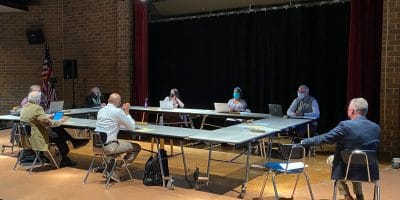
By Bridget Manley, publisher
As the omicron variant spreads, JMU says that it will not require boosters for students and faculty, but is prepared modify requirements if CDC guidelines change.
Following a successful fall semester, with low COVID-19 infection rates, JMU will continue implementing most of the same protocols as last semester, according to Andy Perrine, associate vice-president of communications and marketing.
One change being made, however, involves the weekly testing requirement for all students, faculty and staff who filed a vaccine waiver. Last semester, any unvaccinated person on campus was subject to weekly testing. This semester, they university will only perform weekly testing on unvaccinated students who are moving back onto campus for the spring semester -– not the entire unvaccinated student population.
“What we found was that the positivity rate was so low – we were below 1% for most of the semester – so what that meant was we were testing a lot of unvaccinated people who did not have the disease,” Perrine said. “We were burning a lot of perfectly good tests on people that were healthy.”
Perrine said this change to the testing strategy is due to the massive shortage in COVID-19 test supplies. Instead, the university will focus on testing people who are symptomatic or have known exposure to COVID-19.
“We were throwing 99% of the tests away on people who weren’t potentially sick,” Perrine said.
According to the JMU COVID dashboard, the amount of unvaccinated students and faculty is relatively low: 1,463 students (7% of the student population) received an exemption, while 376 faculty and staff (9.6% of the total) either received a waiver or did not report their vaccination status to the university.
Perrine said that because of the rapidly spread of omicron and evolving CDC guidance, the university knows that it will need to be flexible in its approach.
“This public health crisis changes every day, and we have to be able to pivot along with those changes,” Perrine said. “All of those potential changes are on the table.”
Booster shots are one example of the uncertainties facing JMU as the second semester begins.
Currently, the CDC defines “fully vaccinated” as two doses of the Pfizer or Moderna vaccines, or one dose of the Johnson and Jonson vaccine. While there is debate around changing the definition of “fully vaccinated” to include a booster shot, the CDC has not yet done so.
Further complicating the idea of a booster requirement, according to Perrine, is that many students and faculty have not been able to acquire a booster because of when they were vaccinated.
For instance, students who received their vaccines this summer or early fall will not be eligible for a booster until five to six months after receiving their second shot.
Perrine says he does not foresee JMU enforcing a booster vaccine requirement this semester because of these factors, but didn’t completely rule it out.
Despite not requiring a booster, Perrine said, the university is still asking students who can get a booster shot to do so.
“We are using the word ‘expect,’” Perrine said.
According to the JMU Dashboard, all students have reported their vaccine status to university officials. This fall, JMU took significant steps to ensure all students either obtained a waiver or were vaccinated – and ultimately dis-enrolled a handful of students who did not comply.
However, according to the dashboard, 82 employees either did not provide a waiver or show proof of vaccination.
Perrine said that those 82 employees were subject to progressive disciplinary actions and ultimately had to undergo to weekly testing. Eventually, if they did not show up for testing last fall, they were subject to dismissal.
Perrine said that all employees did end up submitting to weekly testing.
Like most institutions, JMU is also wresting with the confusing recommendations issued by the CDC last week about the amount of days COVID–positive people could spend in isolation.
Sometime next week, the university will issue a decision on shortening the period that students, faculty and employees spend in isolation, according to Perrine.
“Typically, we will follow the CDC guidance as we have in the past,” Perrine said. “Cutting down that amount of time based on the less virulent nature of the new strain is why the quarantine time has been reduced. So, we are finalizing those plans now.”
Perrine also said that officials from the City of Harrisonburg, Rockingham County Sentara RMH, JMU and EMU continue to meet weekly to more broadly coordinate management of the COVID-19 pandemic.
“This is a community-wide approach that we are taking,” Perrine said. “We are sharing notes, we are learning from the city and the county, and we are sharing resources.”
Perrine also echoed what many other local leaders have said since the onset of omicron; that this is a far cry from last winter.
“Now that people are vaccinated and the science tells us that the vaccines are highly effective at minimizing sickness, that puts us in a far different place than we were a year ago,” Perrine said.
Journalism is changing, and that’s why The Citizen is here. We’re independent. We’re local. We pay our contributors, and the money you give goes directly to the reporting. No overhead. No printing costs. Just facts, stories and context. We’re also a proud member of the Virginia Press Association. Thanks for your support.














